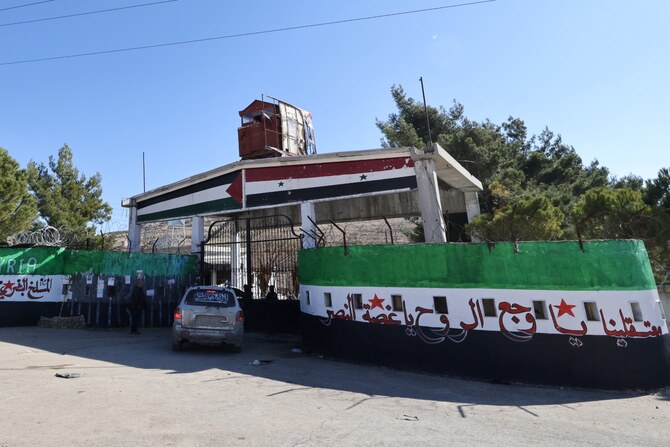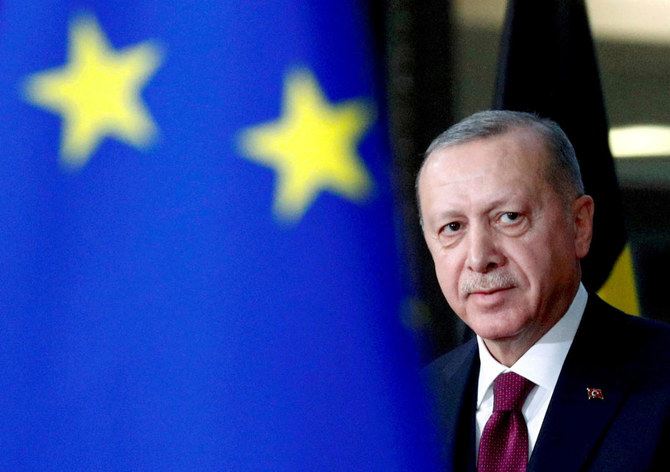BRUSSELS: EU chiefs Ursula von der Leyen and Charles Michel congratulated Turkish voters on their large turnout in the first round of national elections, hailing this as a win for democracy.
“It’s a very clear sign that the Turkish people are committed to exercising their democratic rights to go and vote and that they value the democratic institutions,” von der Leyen said.
Michel also congratulated “Turkish citizens” on their turnout, but neither of Brussels top two officials would be drawn on Turkiye’s long moribund bid for eventual EU membership.
Turkiye now faces its first presidential runoff vote after President Recep Tayyip Erdogan failed to secure a first round re-election in Sunday’s national polls.
The 69-year-old nevertheless did better than expected and could extend his two-decade grip on power on May 28, after neither he nor opposition leader Kemal Kilicdaroglu reached the 50-percent threshold.
Ankara applied to join the European Union in 1987, was declared eligible to begin formal membership talks in 1999 and negotiations began in 2005, only to flounder over the status of Cyprus.
European leaders have had tense relations with Erdogan, who has ruled Turkiye since 2003, and decided talks were at a standstill in 2018, citing backsliding in democratic and judicial reforms.
Kilicdaroglu has pledged to improve ties with Brussels with a view to relaunching the membership ambition, but the EU chiefs were cautious not to be drawn into the tight race.
“The elections are still open. We have to see for the second round, we are following very closely,” von der Leyen said.
EU chiefs congratulate Turks on ‘massive’ vote turnout
https://arab.news/bqfp6
EU chiefs congratulate Turks on ‘massive’ vote turnout

- Turkiye now faces its first presidential runoff vote after President Recep Tayyip Erdogan failed to secure a first round re-election in Sunday’s national polls
Turkish prosecutors target the Istanbul Bar Association

“The Istanbul public prosecutor’s office has begun legal action to remove Istanbul Bar Association president Ibrahim Kaboglu and his executive board,” Turkish Bar Association head Erinc Sagkan wrote on X late Tuesday.
The lawsuit was filed several weeks after the Istanbul Bar Association demanded an investigation into the deaths of two journalists from Turkiye’s Kurdish-majority southeast who were killed in northern Syria.
Nazim Dastan, 32, and Cihan Bilgin, died on December 19 when their car was hit by what the Syrian Observatory for Human Rights said was a “Turkish drone strike” during clashes between an Ankara-backed militia and the SDF, a US-backed group of mainly Kurdish fighters.
Turkiye sees the SDF as a terror group tied to the PKK, which has waged a decades-long insurgency on Turkish soil.
The pair worked for Syrian Kurdish media outlets Rojnews and the Anha news agency, and the strike denounced by the Turkish Journalists’ Union.
The Turkish military insists it never targets civilians but only terror groups.
At the time, the Istanbul Bar Association issued a statement saying “targeting members of the press in conflict zones is a violation of International Humanitarian Law and the Geneva Convention.” It demanded “a proper investigation be conducted into the murder of two of our citizens.”
Prosecutors immediately opened an inquiry into allegations of “making propaganda for a terrorist organization” and “publicly spreading false information” on grounds the two journalists had ties to the PKK.
The Istanbul Bar Association denounced the lawsuit as having “no legal basis” and said its executive council was “fulfilling its duties and responsibilities in line with the Constitution, democracy and the law.”
Turkish Bar Association head Sagkan said: “Although the methods may change, the only thing that has remained constant for the past half century is the effort by the government’s supporters to pressurise and stifle those they see as opponents.”
UNRWA chief vows to continue aid to Palestinians despite Israeli ban

OSLO: The UN’s Palestinian refugee agency UNRWA will continue to provide aid to people in the Palestinian territories despite an Israeli ban due to be implemented by the end of January, its director said Wednesday.
“We will ... stay and deliver,” UNRWA chief Philippe Lazzarini told a conference in Oslo. “UNRWA’s local staff will remain and continue to provide emergency assistance and where possible, education and primary health care,” he said.
Erdogan says Turkiye can ‘crush’ all terrorists in Syria

ANKARA: Turkish President Tayyip Erdogan on Wednesday urged all countries to “take their hands off” Syria and said Turkiye had the capacity and ability to crush all terrorist organizations in the country, including Kurdish militia and Islamic State.
Speaking in parliament, Erdogan said the Kurdish YPG militia was the biggest problem in Syria now after the ousting of former President Bashar Assad, and added that the group would not be able to escape its inevitable end unless it lays down its arms.
World must keep pressure on Israel after Gaza truce: Palestinian PM

OSLO: The international community will have to maintain pressure on Israel after an hoped-for ceasefire in Gaza so it accepts the creation of a Palestinian state, Palestinian Prime Minister Mohammed Mustafa said on Wednesday.
A ceasefire agreement appears close following a recent round of indirect talks between Israel and Hamas, with US Secretary of State Antony Blinken saying late Tuesday that a deal to end the 15-month war was “on the brink.”
“The ceasefire we’re talking about ... came about primarily because of international pressure. So pressure does pay off,” Mustafa said before a conference in Oslo.
Israel must “be shown what’s right and what’s wrong, and that the veto power on peace and statehood for Palestinians will not be accepted and tolerated any longer,” he told reporters.
He was speaking at the start of the third meeting of the Global Alliance for the Implementation of the Two-State Solution to the Israeli-Palestinian Conflict, gathering representatives from some 80 states and organizations in Oslo.
Norwegian Foreign Minister Espen Barth Eide, the host of the meeting, said a “ceasefire is the prerequisite for peace, but it is not peace.”
“We need to move forward now toward a two-state solution. And since one of the two states exists, which is Israel, we need to build the other state, which is Palestine,” he added.
According to analysts, the two-state solution appears more remote than ever.
Prime Minister Benjamin Netanyahu, firmly supported by US President-elect Donald Trump, is opposed to the creation of a Palestinian state.
Israel is not represented at the Oslo meeting.
Norway angered Israel when it recognized the Palestinian state, together with Spain and Ireland, last May, a move later followed by Slovenia.
In a nod to history, Wednesday’s meeting was held in the Oslo City Hall, where Yasser Arafat, Yitzhak Rabin and Shimon Peres received the Nobel Peace Prize in 1994.
The then-head of the Palestinian Liberation Organization, Israeli prime minister and his foreign minister were honored for signing the Oslo accords a year earlier, which laid the foundation for Palestinian autonomy with the goal of an independent state.
Syrians in uproar after volunteers paint over prison walls

DAMASCUS: Families of missing persons have urged Syria’s new authorities to protect evidence of crimes under president Bashar Assad, after outrage over volunteers painting over etchings on walls inside a former jail.
Thousands poured out of prisons after Islamist-led rebels toppled Assad last month, but many Syrians are still looking for traces of tens of thousands of relatives and friends who went missing.
In the chaos following his ouster, with journalists and families rushing to detention centers, official documents have been left unprotected, with some even looted or destroyed.
Rights groups have stressed the urgent need to preserve “evidence of atrocities,” which includes writings left by detainees on the walls of their cells.
But a video appearing to show young volunteers paint over such writings at an unnamed detention center with white paint and adorning its walls with the new Syrian flag, the depiction of a fireplace or broken chains has circulated on social media in recent days, angering activists.
“Painting the walls of security branches is disgraceful, especially before the start of new investigations into human rights violations” there, said Diab Serriya, a co-founder of Association of Detainees and Missing Persons of Saydnaya Prison (ADMSP).
It is “an attempt to destroy the signs of torture or enforced disappearance and hampers efforts to... gather evidence,” he said.
Jomana Hasan Shtiwy, a Syrian held in three different facilities under Assad, often changing cells, said the writings on the walls held invaluable information.
“On the walls are names and telephone numbers to contact relatives and inform them about the fate of their children,” she said on Facebook.
In each new cell, “we would write a memory so that those who followed could remember us,” she said.
A petition appeared on Tuesday calling for the new Syrian authorities to better protect evidence, and give investigating the fate of those forcibly disappeared under Assad “the highest priority.”
It slammed what it called “the insensitive treatment of the sanctity” of former detention centers.
“Some have gone as far as to paint cells, obscuring their features, which for us represents... a great wronging of detainees,” said signatories, including ADMSP.
The president of the International Committee for the Red Cross said last week determining the fate of those who went missing during Syria’s civil war would be a “huge challenge.”
Mirjana Spoljaric said the ICRC was following 43,000 cases, but that was probably just a fraction of the missing.
The Syrian Observatory for Human Rights, a Britain-based war monitor, says more than 100,000 people have died in detention from torture or dire health conditions across Syria since 2011.














